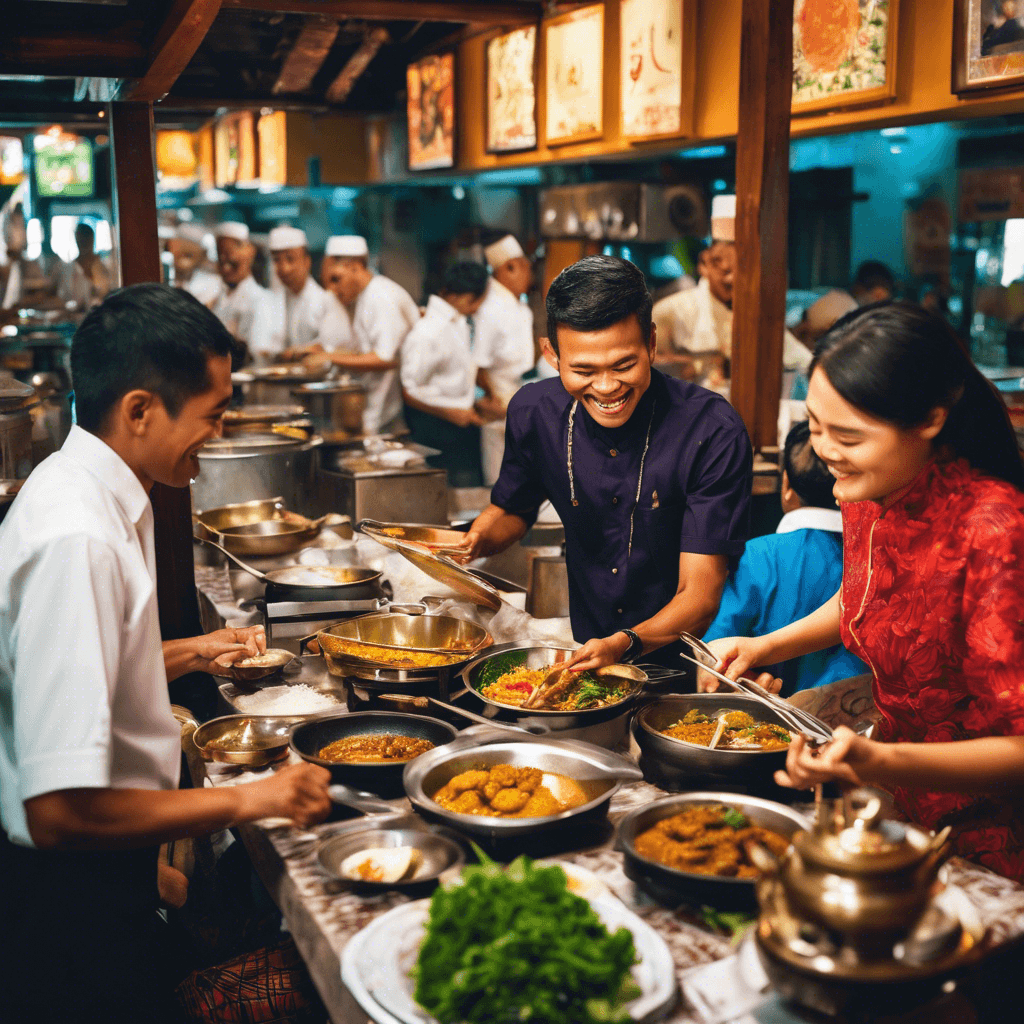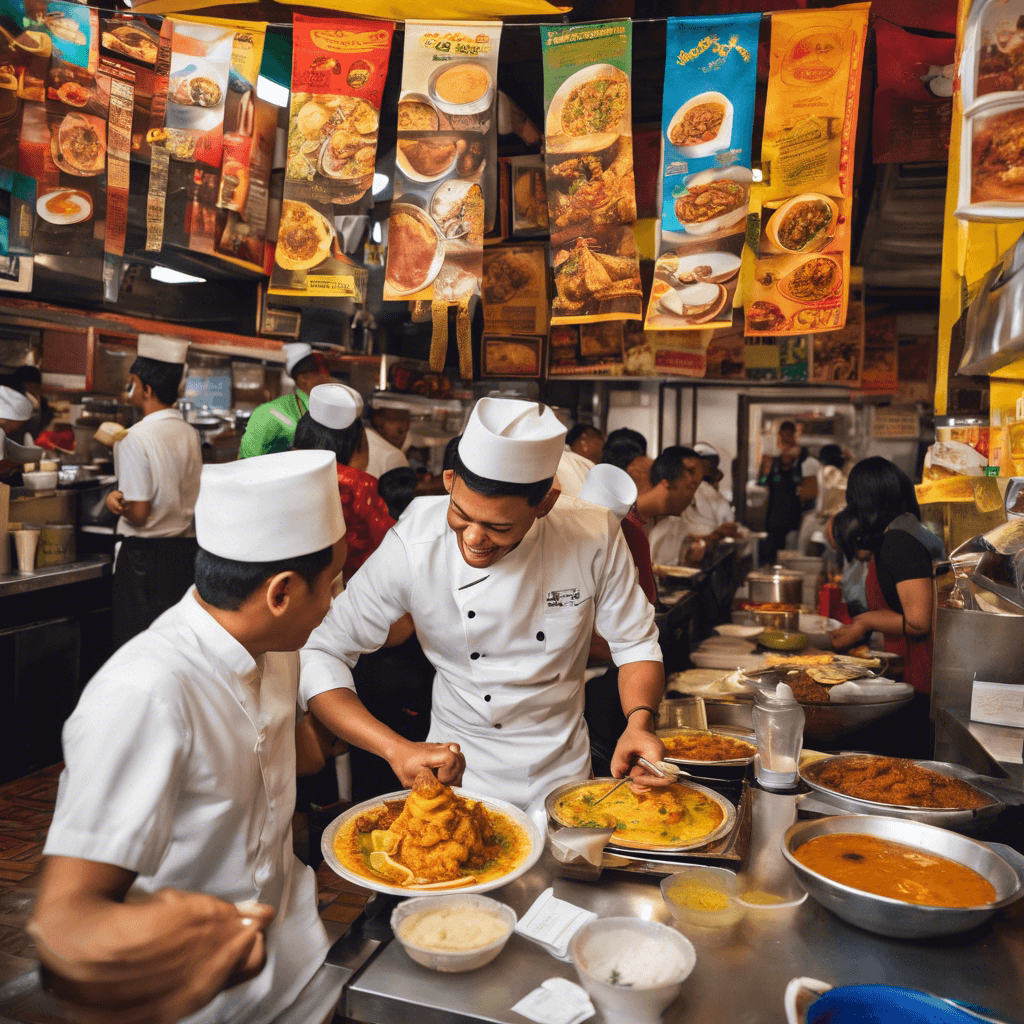In today’s highly competitive digital landscape, implementing effective Local SEO for restaurant in Malaysia is paramount for restaurants in Malaysia to thrive and attract local or foreign customers.
Ensuring that your restaurant has a strong online presence and ranks high on search engine results is crucial for driving organic traffic and increasing visibility.
This article delves into the world of Local Search Engine Optimization (SEO) , exploring key tactics and tips specifically tailored for restaurants in Malaysia.
From optimizing your Google Business Profile listing to leveraging customer reviews, this comprehensive guide will equip you with the knowledge and tools necessary to optimize your restaurant’s online presence and reach a wider local audience.
Understanding Local SEO Restaurant in Malaysia
What is local SEO?
Local SEO refers to the practice of optimizing a website and online presence to target a specific geographic area.
It involves optimizing various elements such as website content, GBP listings, citations, and backlinks to improve a business’s visibility in local search results.
Local SEO is especially important for restaurants as it helps them attract customers in their local area and drive foot traffic to their physical location.
Why is local SEO important for restaurants?
Local SEO is crucial for restaurants because it allows them to reach potential customers who are actively searching for local dining options.
By appearing in local search results, restaurants can significantly increase their online visibility and attract more customers to their establishment.
With the increasing dependence on smartphones and online search, local SEO has become an essential marketing strategy for restaurants to stay competitive in the digital age.
Benefits of local SEO
Local SEO offers several benefits for restaurants. Firstly, it helps increase the visibility of a restaurant in local search results, making it easier for potential customers in the area to find them.
This increased visibility can lead to an increase in website traffic, online reservations, and phone calls to the restaurant.
Secondly, local SEO helps establish trust and credibility with potential customers, as appearing in local search results is seen as a validation of the restaurant’s reputation.
Lastly, by targeting a specific geographic area, local SEO allows restaurants to focus their marketing efforts and resources on a specific market segment, maximizing their chances of attracting local customers.
Keyword Research for Local SEO Restaurant Niche
Importance of keyword research for local SEO
Keyword research is a critical aspect of local SEO as it helps identify the terms and phrases that potential customers are using to search for local restaurants.
By conducting keyword research, businesses can optimize their website content, meta tags, and other elements to target these relevant keywords.
This increases the chances of their website appearing in the search results when people search for those keywords, effectively driving more organic traffic to their website.
Identifying relevant keywords for restaurants
When conducting keyword research for restaurants, it is important to consider both general and localized keywords.
General keywords include terms like “restaurant,” “dining,” or “food,” while localized keywords include the city, neighborhood, or specific cuisine.
For example, a Malaysian restaurant in Kuala Lumpur may want to target keywords such as “Malaysian restaurant in Kuala Lumpur,” “best Malaysian food in KL,” or “top-rated Kuala Lumpur restaurants.”
These localized keywords help the restaurant attract customers who are specifically looking for Malaysian cuisine in the Kuala Lumpur area.
Tools for keyword research
There are several tools available to help with keyword research for local SEO. Google Keyword Planner is a popular choice as it provides insights into search volume, competition, and keyword ideas.
Other tools like SEMrush and Moz also offer keyword research features that can help businesses identify relevant keywords and assess their competition.
It is essential to utilize these tools to optimize website content and target the right keywords to rank higher in local search results.
Optimizing Google Business Profile for Your Restaurant
Creating and optimizing a GBP listing
Google Business Profile (GBP) is a powerful tool for local SEO, particularly for restaurants.
To create and optimize a GBP listing, restaurants should provide detailed and accurate information about their business, including their name, address, phone number, website URL, hours of operation, and menus.
It is important to ensure that all information is up-to-date and consistent across all online platforms.
Additionally, restaurants should optimize their GBP listing by adding relevant keywords, high-quality photos, and encouraging customer reviews.
Importance of accurate and consistent information
Maintaining accurate and consistent information across all online platforms and directories is crucial for local SEO success.
Inaccurate information can lead to confusion among potential customers and negatively impact a restaurant’s online visibility.
Restaurants should regularly check and update their business information on their website, GBP listing, social media profiles, and other relevant directories.
Consistency in NAP (name, address, phone number) information is key to building trust with search engines and potential customers.
Using GBP features for restaurants
GBP offers various features that restaurants can utilize to enhance their online presence.
Restaurants can showcase their menus, post updates or offers, respond to reviews, and even enable online ordering or reservations directly from their GBP listing.
By utilizing these features, restaurants can provide relevant information to potential customers, engage with their audience, and ultimately drive more traffic and conversions to their establishment.

Localized Content Marketing in Malaysia Food
Creating localized content
Creating localized content is crucial for restaurants looking to improve their local SEO. Restaurants can create blog posts, articles, and other forms of content that focus on local topics, events, and trends.
For example, a restaurant in Malaysia could write a blog post about traditional Malay cuisine or review a popular local food festival.
By creating content that resonates with the local audience, restaurants can increase their relevance in local search results and attract more potential customers.
Importance of blog posts and articles for local SEO
Blog posts and articles play a significant role in local SEO for restaurants. They provide an opportunity to target specific keywords and provide valuable information to potential customers.
By regularly publishing high-quality content, restaurants can establish themselves as an authoritative source in their niche, leading to increased visibility in search results and improved organic traffic.
Blog posts and articles also allow restaurants to share their expertise, stories, and unique offerings, building trust with potential customers and encouraging them to choose their establishment.
Utilizing social media for localized content
Social media platforms offer an excellent opportunity for restaurants to share localized content and engage with their local audience. Restaurants can share blog posts, articles, videos, and images that showcase their dishes, events, or behind-the-scenes moments.
By actively engaging with their followers and using relevant hashtags, restaurants can increase the visibility of their content, reach a wider audience, and drive traffic to their website.
Social media platforms also provide an avenue for customers to share user-generated content, such as reviews, photos, or recommendations, further boosting the restaurant’s online presence.
Building Local Citations and Backlinks For Your Restaurant Website
Importance of citations and backlinks for local SEO
Citations and backlinks are essential components of local SEO for restaurants. Citations are references to a restaurant’s name, address, and phone number (NAP) on external websites, directories, or review platforms.
Backlinks, on the other hand, are links from other websites that point back to a restaurant’s website.
Building citations and backlinks improves a restaurant’s online visibility, helps search engines verify the restaurant’s credibility, and enhances its chances of ranking higher in local search results.
Creating accurate and consistent citations
When building citations, it is crucial to ensure accuracy and consistency. Restaurants should provide the same NAP information across all directories, review platforms, and social media profiles.
This includes not only the name, address, and phone number but also details like opening hours, website URL, and any other relevant information.
Inaccurate or inconsistent citations can confuse search engines and potential customers, potentially harming a restaurant’s online visibility.
Strategies for acquiring backlinks
Acquiring backlinks requires a proactive approach. Restaurants can reach out to local influencers, bloggers, or other relevant websites and request them to include a link to their website.
Offering to provide guest posts or collaborating on local events can also help generate backlinks.
Additionally, restaurants can participate in local community initiatives, sponsor events, or partner with local organizations, which can often lead to backlinks from their websites.
By diversifying and actively seeking backlinks, restaurants can improve their website’s authority and online visibility.
Optimizing On-Page SEO for Your Website
Importance of on-page SEO for local restaurants
On-page SEO is crucial for local restaurants as it helps search engines understand the content and relevance of a website.
By optimizing various on-page elements, such as title tags, meta descriptions, and header tags, restaurants can improve their chances of ranking higher in local search results.
On-page SEO also helps provide a better user experience, which is essential for attracting and retaining potential customers.
Optimizing title tags and meta descriptions
Title tags and meta descriptions are important on-page SEO elements that should be optimized for local restaurants. Title tags should be concise, descriptive, and include relevant keywords.
They should accurately represent the content on the page and entice potential customers to click. Meta descriptions provide a brief summary of the page’s content and should also include keywords.
By optimizing title tags and meta descriptions with relevant and localized keywords, restaurants can increase their visibility in search results and attract more organic traffic.
Optimizing website content and images
Restaurants should optimize their website content to target relevant keywords and provide valuable information to potential customers. This includes incorporating localized keywords naturally within the content, ensuring it is well-written and engaging.
Restaurants should also optimize their images by using descriptive file names and alt tags that include relevant keywords.
By optimizing both content and images, restaurants can improve their website’s relevance, user experience, and overall local SEO performance.
Mobile Optimization for Your Website
Importance of mobile optimization for local SEO
Mobile optimization is incredibly important for local SEO, especially for restaurants. With the increasing use of smartphones and mobile devices, more and more people are using their mobile devices to search for local restaurants in Malaysia.
Restaurants that do not have a mobile-friendly website or a responsive design risk losing potential customers who may become frustrated with a poor mobile experience.
Mobile optimization ensures that potential customers can easily navigate the website, view menus, make reservations, and access essential information, ultimately driving more conversions.
Responsive design and mobile-friendly websites
One of the key components of mobile optimization is having a responsive design. Responsive design ensures that a website automatically adjusts its layout and elements to fit different screen sizes and resolutions.
This means that whether a potential customer is viewing the website on a desktop computer, tablet, or smartphone, they will have a seamless and user-friendly experience.
Creating a mobile-friendly website involves optimizing website speed, ensuring easy navigation, and making sure that all functions and features function properly on mobile devices.
Optimizing page load speed for mobile devices
Page load speed is a crucial factor in mobile optimization for local SEO. Slow-loading websites can negatively impact user experience and lead to higher bounce rates.
To optimize page load speed for mobile devices, restaurants should compress images, minimize the use of heavy scripts or plug-ins, and leverage caching and content delivery networks (CDNs).
Additionally, proper website hosting and regular monitoring of website speed can help identify and resolve any issues that may slow down the website, ensuring a smooth and fast mobile browsing experience for potential customers.

Local Reviews and Ratings in Your GBP
Encouraging customer reviews
Customer reviews and ratings play a significant role in local SEO for restaurants. Positive reviews can improve a restaurant’s online reputation and build trust with potential customers.
Encouraging customers to leave reviews can be done through various means, such as providing incentives, sending follow-up emails, or displaying review request cards at the restaurant.
It is important to remind customers of the importance of their feedback, respond promptly to reviews (both positive and negative), and express gratitude for their support.
Responding to reviews
Responding to customer reviews is crucial for maintaining a positive online reputation and engaging with potential customers. Restaurants should respond to both positive and negative reviews in a professional and timely manner.
For positive reviews, restaurants can express gratitude, highlight specific compliments, and encourage customers to visit again.
For negative reviews, it is important to respond with empathy, address the concerns raised, and offer a resolution if appropriate. By responding to reviews, restaurants can show their commitment to customer service and build trust with both current and future customers.
Incorporating reviews on the website
To further boost their online presence and local SEO, restaurants can incorporate customer reviews on their website.
Adding a testimonials or reviews section allows potential customers to see positive feedback directly on the restaurant’s website. Restaurants can also display reviews from popular review platforms or social media sites.
By showcasing customer reviews, restaurants not only enhance their online reputation but also provide valuable information and social proof to potential customers, encouraging them to choose their establishment.
Local Schema Markup
What is schema markup?
Schema markup is a form of structured data that provides search engines with additional information about a webpage’s content.
It helps search engines understand the context and significance of the content, allowing them to display more relevant and informative search results.
Local schema markup specifically includes elements that provide information about a local business, such as its name, address, phone number, and opening hours.
Importance of local schema markup for restaurants
Implementing local schema markup is crucial for restaurants as it helps search engines understand the restaurant’s details and enhances its visibility in local search results.
Local schema markup enables search engines to display rich snippets, such as star ratings, reviews, and specific service offerings, directly in the search results. This increased visibility and rich information can significantly impact a restaurant’s click-through rate and organic traffic.
Implementing schema markup for local SEO
To implement schema markup for local SEO, restaurants can utilize schema.org vocabulary and add relevant schema markup to their website’s HTML.
There are various types of schema markup available for local businesses, including “Restaurant,” “LocalBusiness,” “OpeningHoursSpecification,” and “Review.”
Restaurants can include specific details, such as their name, address, phone number, cuisine type, menu items, and customer reviews.
Properly implementing local schema markup helps search engines understand and display the relevant information, improving a restaurant’s local SEO performance.
Staying Up-to-Date with Restaurant Local SEO Trends in Malaysia
Understanding the dynamic nature of local SEO
Local SEO is a constantly evolving field, with search engines frequently updating their algorithms and ranking factors. It is essential for restaurants to stay up-to-date with these changes and adapt their strategies accordingly.
Being aware of the latest trends and best practices allows restaurants to remain competitive and make informed decisions when optimizing their online presence for local search.
Following industry blogs and forums
One of the best ways to stay informed about local SEO trends is to follow industry blogs and forums. There are several reputable websites that regularly publish updates, insights, and tips related to local SEO.
By subscribing to these blogs, restaurants can stay informed about algorithm updates, new features or tools, and emerging trends.
Participating in online forums or communities also provides an opportunity to connect with other industry professionals and share knowledge and experiences.
Adapting strategies to algorithm updates
Search engines frequently update their algorithms to provide more accurate and relevant search results.
These updates can have a significant impact on a restaurant’s local SEO performance. It is important for restaurants to monitor algorithm updates and adapt their strategies accordingly.
This may involve making adjustments to website content, improving website speed and usability, or prioritizing certain factors, such as mobile optimization or user experience.
By staying proactive and adaptable, restaurants can maintain and improve their organic visibility in local search results.





0 Comments